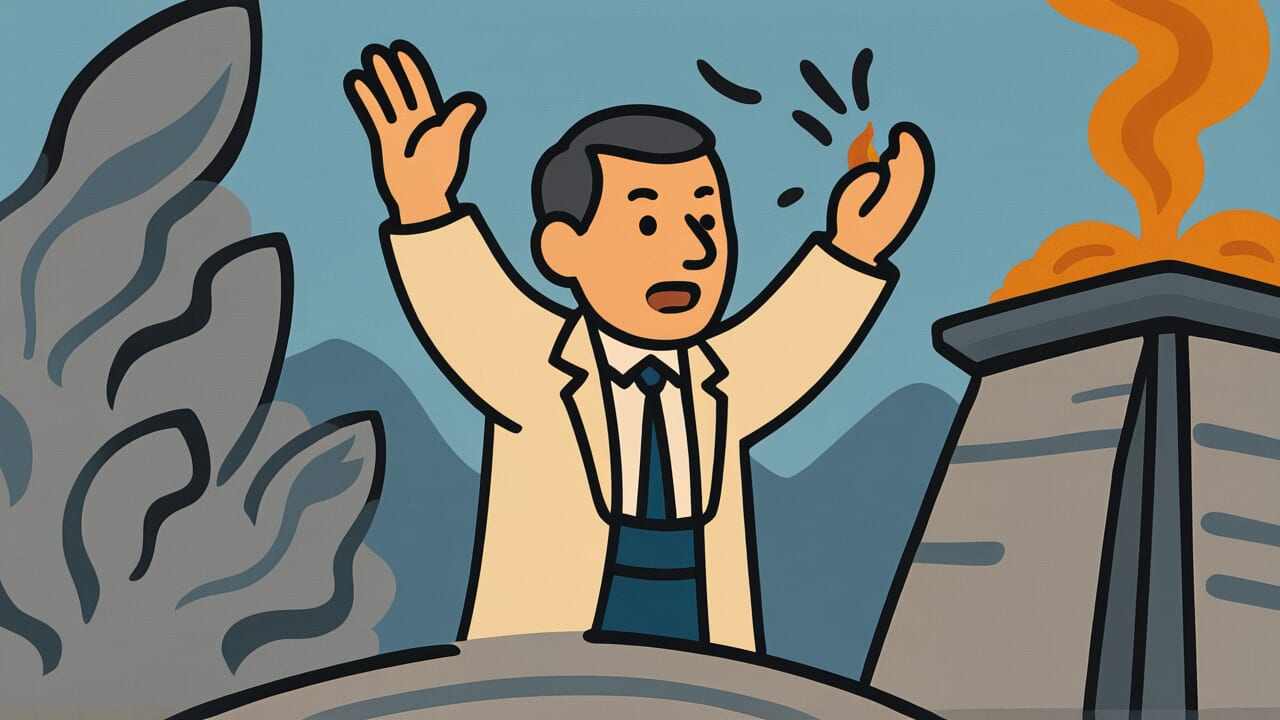How to Read “Fools and smoke rise to high places”
Baka to kemuri wa takai tokoro e noboru
Meaning of “Fools and smoke rise to high places”
This proverb describes how foolish people tend to seek high positions and crave attention.
People with real ability and virtue don’t desperately seek high positions or try to stand out in public. Instead, they remain humble and understand their own limitations.
On the other hand, foolish people who can’t recognize their own abilities or limits have baseless confidence. They want to climb to high positions and places where they’ll get attention.
People use this proverb to criticize or mock such individuals. When you see someone acting important without real ability, or behaving beyond their means, you might say “That’s exactly ‘Fools and smoke rise to high places.'”
Even in modern society, this proverb applies to many situations. Think of people who show off excessively on social media, or those who talk big without actual achievements.
This saying captures a universal observation about human nature: truly capable people are humble.
Origin and Etymology
No clear written records explain the origin of this proverb. However, people were already using it widely during the Edo period.
Let’s look at the “smoke” part first. Smoke always rises upward as a physical property. It moves up with heated air.
This is a natural phenomenon everyone sees in daily life. When you light a fire, smoke always goes to high places. This obvious fact forms the foundation of the proverb.
What’s interesting is how this natural phenomenon was compared to human behavior. Just as smoke rises without any will or thought, foolish people instinctively seek high positions and prominent places without deep thinking.
This comparison is the heart of the proverb.
In Edo period class society, people often satirized those who sought status and fame without real ability or virtue. Common people sharply observed how some individuals wanted to rise higher and higher like smoke, despite having no substance.
By using smoke, a natural phenomenon everyone knows, the proverb expresses complex human psychology in one phrase. This shows the keen observation and linguistic sense of Japanese people.
Usage Examples
- That person acts important without real ability. It’s exactly “Fools and smoke rise to high places.”
- A newcomer trying to give advice to management? That’s “Fools and smoke rise to high places” in action.
Universal Wisdom
This proverb has been passed down for hundreds of years because it perfectly captures a fundamental human weakness.
Everyone has desires to be recognized, respected, and stand in high places. These desires aren’t bad in themselves.
The problem occurs when people lack the ability to see themselves objectively. People who can’t accurately recognize their own abilities and limits become filled with baseless confidence. They seek positions and attention beyond their actual capacity.
What’s interesting is the paradox that truly excellent people tend to be humble. Capable people know how much they don’t know.
The more they learn, the more they realize how vast the world is and how small they are. Meanwhile, people with shallow knowledge and experience easily believe they know everything.
Modern psychology recognizes this as the “Dunning-Kruger effect.”
Our ancestors saw smoke, something with no substance, rising upward. They compared this to people with no real content seeking high places.
This sharp observation remains an eternal truth as long as humans create societies and hierarchies. It continues to ask us: What is true ability? What is humility?
When AI Hears This
In information theory, information value is measured by “low predictability.” In other words, saying what everyone already knows has zero information value.
Yet people with low ability can’t judge how common their statements are. Dunning-Kruger effect research shows that people in the bottom 25 percent rated themselves in the top 60 percent.
Why does this gap exist? Because “the ability to evaluate your statements” and “the ability to make good statements” are the same thing. Just as people who cook badly can’t tell their food tastes bad.
Here the rising smoke becomes an interesting metaphor. Smoke rises because it has low density. In other words, the thinner the content, the more it floats up.
Think about social media. People with deep expertise become more careful with their statements. They know the limits of their knowledge.
Meanwhile, people with only surface understanding post with complete confidence and make definitive statements. And algorithms tend to spread “definitive, easy-to-understand posts.”
This means content with low information entropy and high predictability rises to prominent positions.
Edo period people, through observing the physical phenomenon of smoke, saw through to this essential truth of the information age.
Lessons for Today
This proverb teaches us living in modern times the value of humility and the importance of self-awareness.
In today’s social media age, anyone can easily broadcast themselves and stand out. But this makes distinguishing real ability from appearance even more important.
If you want to accomplish something, you first need to know accurately where you stand now.
Have the courage to look calmly at your strengths and weaknesses. Value the honesty to admit when you don’t know something.
This isn’t shameful. It’s the first step toward growth.
At the same time, this proverb helps you see others more clearly. Loud people and flashy performers aren’t necessarily excellent. You need the ability to identify truly trustworthy people worth learning from.
Most importantly, keep polishing your real abilities. If you accumulate steady effort and develop genuine strength, you’ll naturally gain recognition without forcing yourself to climb high.
Don’t be like smoke with no substance. Become a real person with both feet firmly on the ground.



Comments